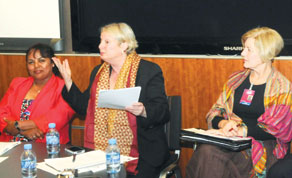 |
| Elizabeth Birch, General Partner at True Blue Inclusion, addressing a panel of corporate, government and NGO representatives |
The “Doha Process” has, for the first time through the UN Alliance of Civilisations Forum, brought together the best thinking on diversity and inclusion in and among the corporate, government and civil society sectors.
“What we know is that there are a number of companies that actually adopted policy practices and values that are way ahead of what is required by governments, and so (the Doha Process) it is an opportunity to begin interaction with governments, to say that we respect the fact that you are a government and have sovereignty, but there are certain values where we want to really make sure that when your citizens come to work, they feel fully included and fully valued and fully equal in terms of the opportunities,” said Elizabeth Birch, General Partner at True Blue Inclusion.
The message that a large number of progressive companies want to send is that “while there may be cultural norms that operate outside, when people work here we treat them with full equality. That would include gender, disability, any kind of difference that may within the culture get drummed out. Even things like the caste system in India…a corporation may wish to really aggressively turn that on its head and open up opportunity in ways that maybe don’t exist normally”.
Birch highlighted some of the challenges facing companies that governments and societies often do not yet have solutions for. Many companies have been testing men and women and in many cases women are consistently testing higher than male applicants. However, companies are unsure as to how far they should go in pushing women towards developing their career and promoting them to management when society is pulling them towards marriage, which often removes them from the workforce completely.
“A company may have a policy that protects its lesbian, gay and transgender employees, and they want to open an operation in Singapore where it is against the law, or in Nigeria where the laws are becoming more challenging, or Uganda, what do they do? How do they manage through that as a company?
“A Muslim employee in the United States may want to pray, and keep a regular prayer rhythm, and yet there is no meditation room and the employer may not accommodate that.”
Panellists agreed that it is crucial that companies are sensitive to the culture of their host countries, but that is not to say that they should ignore their own corporate culture for the sake of economic opportunism. A number of panellists who specialise in corporate diversification said that companies frequently come to them saying that they want to do the right thing for their employees and be good corporate citizens, but they are unsure as how to proceed. The UNAOC Forum facilitates the sharing of best thinking and best practices among key sectors. To keep the process going, the parties involved will ultimately create a “think-tank that would live on beyond this forum, and maybe drive towards the next one, publish papers, publish best-practices”, said Birch.
One panellist said that with big cutbacks in government spending, there is an expectation that civil society can fill the void, even though that is not necessarily possible. He pointed out that there are now corporations that are bigger financially than governments and have more employees than many countries’s population. He argued that there needs to be more mechanisms where corporations are playing their rightful role as the major economic engines, bringing them into discussions with civil society and addressing the problems of people, government and business together.

